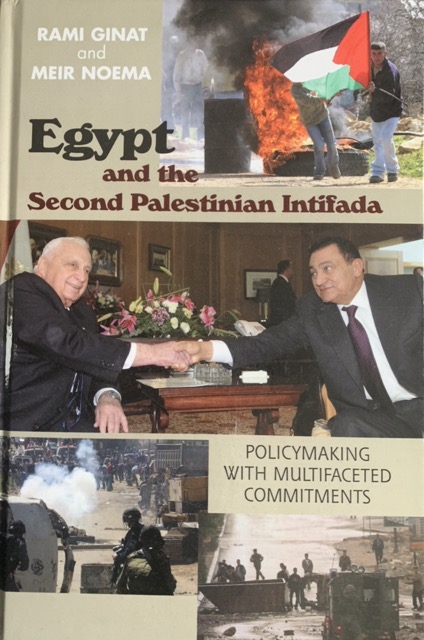Imperialism, Colonialism and Dispute Settlements
Some of my research areas deal with regional disputes and conflicts, and the attempts to settle them in the Middle East (including Sudan), and the Nagorno-Karabakh region. My book Egypt and the Struggle for Power in Sudan (Cambridge: Cambridge University Press, 2017) deals with the ongoing dispute between Egypt and Great Britain over the future of Sudan. For decades, the doctrine of the 'Unity of the Nile Valley' united Egyptians of a variety of political and nationalist backgrounds. Many Egyptians regarded Sudan as an integral part of their homeland, and therefore battled to rid the entire Nile Valley of British imperialism and unite its inhabitants under the Egyptian crown. The study provides a vital and important revised account of the history of Egypt's colonialist struggle and their efforts to prove categorically that the Nile Valley constituted a single territorial unit. These were clustered around several dominant theoretical layers: history, geography, economy, culture and ethnography. This book, for both Middle Eastern and African historians, uses a mixture of Arabic and English sources to critically examine the central stages in the historical development of Egypt's doctrine, concentrating on the defining decade (1943–1953) that first witnessed both the pinnacle of the doctrine's struggle and the subsequent shattering of a consensual nationalist dream.
My book Egypt and the Second Palestinian Intifada (Brighton and Portland: 2011) discusses the implications of the five-year intifada on Israeli-Egyptian relations. With the outbreak of the Palestinian Intifadat al-Aqsa in September 2000 that followed the failure of the Camp David II summit, the chain of belligerent events took Egypt by surprise. Facing a dilemma in its search for an appropriate policy towards the Palestinian–Israeli escalation, this study argues that Egypt's policy towards the second Intifada may best be understood by scrutinizing several circles of reference that directly affected its policymaking process throughout the long years of the bloody Israeli–Palestinian conflict. These circles of reference comprise interests and calculations derived from Egyptian internal issues; regional factors – Egypt's role and position in the Arab world in general, and its relations with the Palestinians in particular; Egypt's relations with Israel; and its strategic ties with the United States. The growing strength and the expansion of the global Islamic terrorist network that challenges the stability of the present Arab regimes constitutes a lynchpin at every layer.
The study shows that Egypt's foreign policy is based on Realpolitik, that is, on pragmatic and material factors rather than on ideological or moral considerations. Safeguarding its national interests is Egypt's prime goal. In this regard, Egypt considers the peace with Israel as a strategic national asset. For Mubarak's regime, the abrogation of the peace treaty with Israel has never been an option, even during the worst days of the Intifada. Mubarak has shown exemplary restraint throughout the conflict. Despite occasional harsh anti-Israeli statements aimed mainly at easing internal and external pressures, Mubarak's regime can, on the whole, be seen as a responsible and stabilizing factor vehemently striving to prevent regional escalation. This study is based primarily on Egyptian sources as well as interviews and conversations with senior members of the Al-Ahram Center for Strategic Studies. It also draws on other primary and secondary sources in Arabic, Hebrew and English. The book is essential reading for all scholars involved and engaged with the Israel–Arab conflict.
The conflict in Nagorno-Karabakh, an autonomous region contested by both Azerbaijan and Armenia, began in February 1988 following a series of strikesand demonstrations held by Armenians living there. However, Our study (with Arie Vaserman) “National, Territorial or Religious Conflict? The Case of Nagorno-Karabakh” Studies in Conflict and Terrorism (1994), clearly shows that the eruption of this conflict was a result of a long and gradual process that goes back to the first quarter of the 20th century. The study exposes, describes, and analyses the historical background of the events that led to the development of this extended and ongoing conflict. In doing so, it examines the nature of this conflict and questions whether or not it is possible that the conflict is at the same time both territorial and national religious. It also examines the possible far-reaching consequences of the conflict for the future of the region which could ultimately alter constellations of power in Central Asia, in the Middle East, and even globally.
Reviews of Egypt and the Struggle for Power in Sudan

“Remarkable accomplishment, illuminating and insightful. Egypt and the Struggle for Power in Sudan offers a fresh and original reading of the Egyptian national struggle for unity of the Nile Valley. Combining intellectual with political history, Rami Ginat, examines, in a most sophisticated yet concrete manner, the British-Egyptian rivalry for control and hegemony in Sudan and explains why it culminated dramatically in the 1940s and early 1950s. Ginat systematically and comprehensively reconstructs a broader, multi-vocal system of the Egyptian public’s responses to the doctrine of the Nile Valley unification by the ruling elite as well as broader civil society. The book ends with a requie m for the Nile Valley unity dream, shattered by the new 1952 July Revolution regime, who recognized Sudan’s right to national self-determination and independence.” Professor Israel Gershoni - Tel-Aviv University (2017)
“Based on diligent, impeccable archival research, Ginat challenges deep-rooted nationalist narratives to provide a dispassionate, nuanced look at the complexities - and contradictions - of Egyptian claims to sovereignty over the Nile Valley. Situated within the broad contexts of British imperialism and Egyptian and Sudanese decolonization, this is a splendid work of political and intellectual history.” Professor Joel Gordon - Director of the King Fahd Center, University of Arkansas, and author of Nasser’s Blessed Movement: Egypt’s Free Officers and the July Revolution (2017)
“… an in-depth book about a relatively short period of history that saw the unraveling of a complex imperial situation...the book adds significantly on each of its main themes. First, the thinking behind Egypt's three unsuccessful political attempts to oust Britain from Sudan and re-impose its sovereignty under King Faruq: direct agreement through the Sidqi-Bevin protocol; international pressure via the United Nations; and finally, outright abrogation of the condominium. Second, Egypt's attempt to reshape the culture of Sudan by an extensive program of education designed to counter British-style educational development. And third, the ideological contrasts of Left and Right with their very different views on the longer term for both Egypt and Sudan, whether toward an Islamist direction or more populist liberation.” Peter Woodward (University of Reading), Middle East Journal (2018)
“… Remarkable book… It’s an illuminating study that explores Sudan’s rather unique place in the history of imperialism … the distinctive feature of Ginat’s study is his masterful analysis of the wider postwar intellectual scene, with its various factions (from Egyptian communists to right-wing nationalist or Islamic groups, like Young Egypt or the Muslim Brothers, respectively, as well as to liberal constitutionalists and independent intellectuals) and the changing relationships between the intelligentsia and the state. His analysis of the discursive unities covers a range of knowledge practices, from economic and geographical studies to historical and ethnographic accounts.
In moving between regional and international levels of analysis, Egypt and the Struggle for Power in Sudan forces historians to rethink certain assumptions about the complex and contradictory relationships between imperialism and nationalist movements, while providing a definitive political and intellectual history of Egypt’s postwar struggle for control over Sudan.”Brian Peterson (Union College), The American Historical Review (2019)
Reviews of Egypt and the Second Palestinian Intifada

https://www.liverpooluniversitypress.co.uk/doi/book/10.3828/9781845193898
“This book seeks to study the policy of Mubarak’s Egypt regarding the second Palestinian Intifada during the years 2000-2005, encompassing its military facets and political implications…In their book, Ginat and Noema examined Egyptian newspapers and conducted interviews with different Egyptian researchers and scholars. These sources enabled the authors to present the reader with a comprehensive historical picture that is coherent and especially interesting. This research undoubtedly adds an important layer to the understanding of the Israeli–Palestinian-Arab relations...”Dr. Jacob Tovy (Independent Researcher), Association for the Study of the Middle East and Africa (ASMEA)

